The Best eCommerce Platforms to Build an Online Store in 2024
Discover the top eCommerce platforms in 2024 for building your online store. Compare features, pricing, and ease of use to find your perfect fit.

The ever-changing digital industry has made eCommerce an essential aspect of modern business operations. As more and more customers opt for online shopping, there is no better time to establish a flourishing online store. As we move into 2024, a wide range of eCommerce platforms is at your disposal, each with distinct features and tools designed to help you excel in online commerce. With many choices, how can you determine the ideal platform for your specific needs?
In this detailed guide, we will examine the leading eCommerce platforms of 2024, scrutinizing their functionalities, and compatibility to equip you with the necessary information to make a well-informed decision for your online store. Whether you are a small business owner seeking to broaden your customer base, a budding entrepreneur launching a fresh venture, or an established retailer aiming to amplify your online footprint, our in-depth analysis will guide you through the complex world of eCommerce with certainty.
Stay with us as we evaluate the pros and cons of each platform, covering vital elements such as user-friendliness, adaptability, payment alternatives, and more. Our mission is to deliver a straightforward and succinct guide that directs you towards the perfect eCommerce solution customized to your particular business needs. Let's join forces on this exhilarating journey and turn your vision into a thriving online store in 2024!
Main eCommerce platform options
In 2024, selecting the appropriate eCommerce platform for your online store is a critical factor in achieving success. With various options available, it's essential to consider aspects such as user-friendliness, scalability, customization options, and support to make an educated decision. We will explore the three primary types of eCommerce platforms: Open-Source, Software-as-a-Service (SaaS), and Headless Commerce.
Open-Source
Open-source eCommerce platforms provide a significant degree of adaptability and customization for businesses looking to create a distinctive online store. These platforms are built on open-source code, enabling developers to modify and expand the functionality to meet specific requirements.
The primary advantage of open-source platforms is their ability to accommodate the unique needs of a business. However, this comes with the potential for increased development and maintenance costs. Businesses opting for open-source solutions should be prepared to invest in technical resources and consider ongoing maintenance and security updates.
SaaS (Software-as-a-Service)
SaaS eCommerce platforms are cloud-based solutions that offer all the necessary tools and infrastructure needed to construct and manage an online store. These platforms typically follow a subscription-based pricing model, allowing businesses to access the software without incurring the initial costs associated with traditional software licensing.
The main advantage of SaaS solutions is their simplicity and ease of use. With integrated hosting, security, and regular updates, businesses can concentrate on growing their online store without being concerned about technical details. However, SaaS platforms may have limitations in terms of customization and scalability compared to open-source solutions. Businesses should carefully evaluate their long-term needs before committing to a SaaS platform.
Headless Commerce
Headless commerce is a cutting-edge approach to eCommerce that separates the frontend presentation layer from the backend infrastructure. This division enables businesses to create unique, customized customer experiences while leveraging the power and flexibility of API-driven backend systems.
The primary advantage of headless commerce is its ability to offer a highly customizable and scalable solution. Businesses can create bespoke shopping experiences across various channels, including web, mobile, and IoT devices. However, headless commerce may necessitate a higher level of technical expertise for implementation and management and potentially increased costs associated with creating custom frontend experiences.
Things to consider when choosing your E-commerce platform
When selecting an eCommerce platform for your online business, it is crucial to meticulously evaluate several key factors in order to optimize performance, scalability, and overall user experience:
-
Analyze the platform's architecture and its ability to integrate with existing and future technologies, such as APIs, ERP, CRM, and payment gateways, ensuring seamless interoperability and extensibility.
-
Scrutinize the platform's security measures, including PCI DSS compliance, SSL certification, and powerful authentication mechanisms, to guarantee the protection of sensitive customer data and instill trust in potential clients.
-
Assess the scalability of the platform to accommodate anticipated growth, considering factors such as cloud infrastructure, load balancing, and caching mechanisms that ensure optimal performance during peak traffic periods.
-
Investigate the platform's SEO capabilities, which encompass URL structure, metadata management, and schema markup implementation, to improve organic search rankings and drive traffic.
-
Examine the platform's native and third-party functionality for analytics, marketing, and customer support, to streamline business operations and foster customer retention.
By meticulously evaluating these factors, businesses can identify a holistic eCommerce solution that fosters sustainable growth and enduring success.
How can no-code solutions help
No-code solutions can significantly benefit businesses and individuals by streamlining software development processes, minimizing technical barriers, and accelerating time-to-market. Here are some key advantages of utilizing no-code platforms:
-
Accessibility: No-code platforms empower non-technical users to create functional applications, democratizing software development and allowing a wider range of individuals to contribute to digital projects.
-
Rapid prototyping: With drag-and-drop interfaces and pre-built templates, no-code solutions enable swift development and testing of prototypes, facilitating iterative improvement and faster validation of ideas.
-
Cost-effectiveness: By circumventing the need for extensive coding expertise, no-code platforms can reduce development costs and mitigate the risks associated with custom software projects.
-
Agility and flexibility: No-code solutions allow for seamless adaptation and modification of applications, enabling businesses to respond quickly to changing market conditions and customer needs without extensive development efforts.
-
Enhanced collaboration: The simplicity and transparency of no-code platforms promote collaboration between technical and non-technical team members, fostering a cross-functional approach to problem-solving and decision-making.
-
Scalability: Many no-code platforms are built cloud-based infrastructure, ensuring that applications can scale smoothly as the user base or data requirements grow.
-
Maintenance and support: No-code platforms typically handle updates, security patches, and bug fixes, relieving businesses of the burden of ongoing maintenance and allowing them to focus on core operations.
The best E-commerce platforms of 2024
Shopify
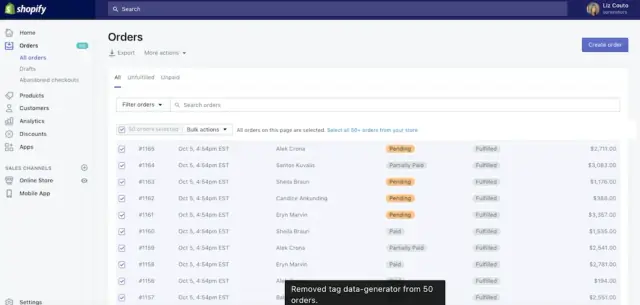
Shopify is an all-inclusive e-commerce platform that offers a set of features for businesses of all sizes. With an intuitive interface and a wide array of themes and plugins, Shopify simplifies the process of setting up an online store.
Shopify's powerful inventory management system allows businesses to manage their products, track inventory, and fulfill orders seamlessly. Moreover, the platform provides integration with popular payment gateways, ensuring smooth transactions for customers. Shopify's built-in analytics and reporting tools provide valuable insights into sales trends, customer behavior, and overall performance.
Some notable Shopify features include:
-
Abandoned cart recovery
-
Multilingual capabilities
-
Seamless integrations with third-party apps
-
Customizable storefront
Shopify is an excellent choice for businesses looking for an all-in-one solution with exceptional scalability and ease of use.
Square
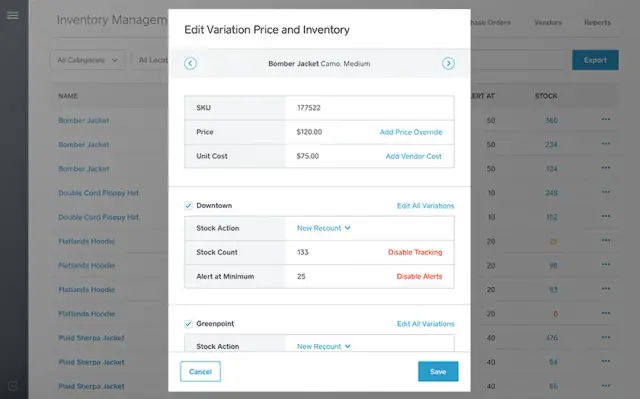
Square is a comprehensive e-commerce solution that offers a wide range of features to help businesses create and manage their online stores. Square integrates seamlessly with the Square POS system, making it an ideal choice for brick-and-mortar businesses looking to expand their reach online.
The platform's robust inventory management system allows businesses to synchronize their online and offline inventory, making tracking sales and updating stock levels easier. Square also offers a variety of customizable templates, allowing businesses to create a professional online store that reflects their brand identity.
Key Square features include:
-
Integrated shipping and fulfillment options
-
In-person and online payment processing
-
Real-time sales and inventory tracking
-
Advanced reporting and analytics
With its comprehensive feature set and seamless integration with the Square POS system, Square is an excellent choice for businesses looking to build a cohesive online and offline retail experience.
Ecwid
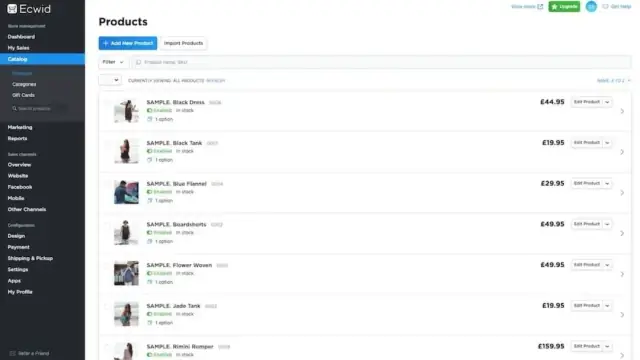
Ecwid is a versatile e-commerce platform that allows businesses to add an online store to their existing website, blog, or social media page. The platform's unique selling point is its adaptability, as it integrates with various content management systems (CMS) and site builders.
Ecwid offers a rich set of features, including inventory management, multiple payment gateways, and real-time shipping quotes. The platform also supports multi-channel selling, allowing businesses to manage sales across various platforms from a single dashboard.
Some notable Ecwid features include:
-
Mobile-responsive design
-
SEO-friendly storefront
-
Integration with popular CMS and site builders
-
Social media selling capabilities
Ecwid is a great option for businesses looking to expand their online presence without rebuilding their entire website.
BigCommerce
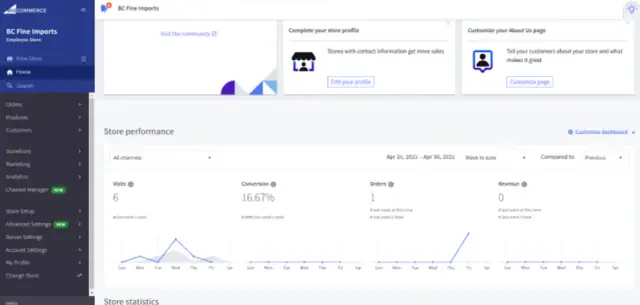
BigCommerce is a feature-rich e-commerce platform designed for businesses of all sizes. Its powerful API and extensive app ecosystem make it an ideal choice for businesses looking to build a highly customized online store.
BigCommerce offers a variety of built-in marketing tools, including email marketing, search engine optimization (SEO), and social media integration. The platform also provides advanced inventory management, multiple payment gateways, and a wide range of shipping options.
Key BigCommerce features include:
-
Customizable themes and templates
-
Scalable hosting and security
-
Built-in marketing and SEO tools
-
Extensive app marketplace
For businesses looking to build a customizable and scalable online store, BigCommerce is a top choice.
WooCommerce
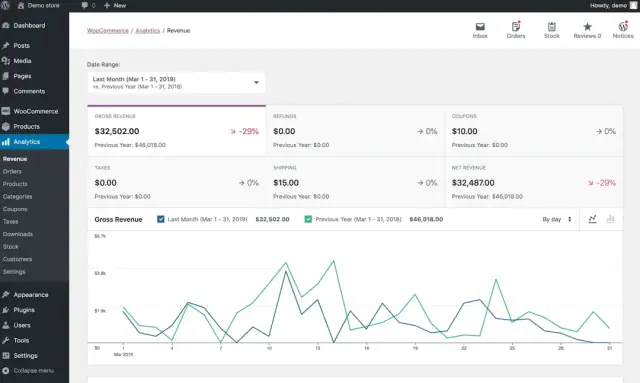
WooCommerce is a popular, open-source e-commerce platform built specifically for WordPress. Its flexibility and extensive customization options make it a top choice for businesses that already have a WordPress site or prefer to build their online store on the popular CMS. With a vast ecosystem of plugins and themes, WooCommerce allows businesses to create an online store tailored to their specific needs.
WooCommerce offers a range of essential e-commerce features, including product management, inventory tracking, and multiple payment gateways. The platform also provides advanced reporting and analytics, enabling businesses to make informed decisions about their online store's performance.
Notable WooCommerce features include:
-
Seamless integration with WordPress
-
Wide variety of plugins and extensions
-
Support for multiple currencies and languages
-
Built-in blogging capabilities
For businesses that want to leverage the power of WordPress and build a highly customizable online store, WooCommerce is an ideal choice.
Wix
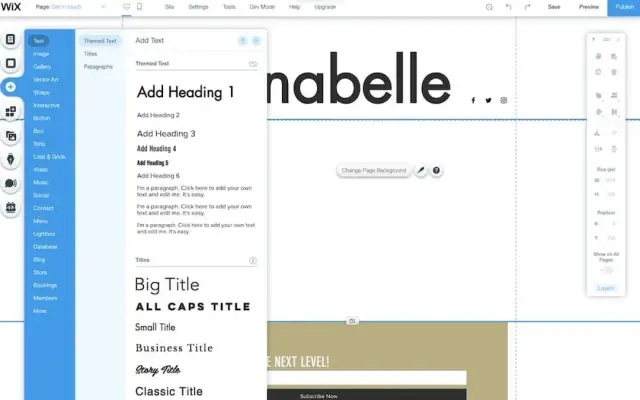
Wix is a user-friendly website builder and e-commerce platform that offers an intuitive drag-and-drop interface, making it easy for businesses to create a professional online store without any coding knowledge. With various templates and design elements, Wix allows users to create a unique online store that reflects their brand identity.
The platform's built-in e-commerce features include inventory management, multiple payment gateways, and real-time shipping quotes. Wix also offers powerful marketing tools like email campaigns, social media integration, and SEO optimization.
Key Wix features include:
-
Drag-and-drop website builder
-
Mobile-responsive templates
-
Secure online payments and order management
-
Integrated marketing and promotional tools
Wix is a great option for small businesses and entrepreneurs who want to create a visually appealing online store with minimal technical expertise.
AppMaster
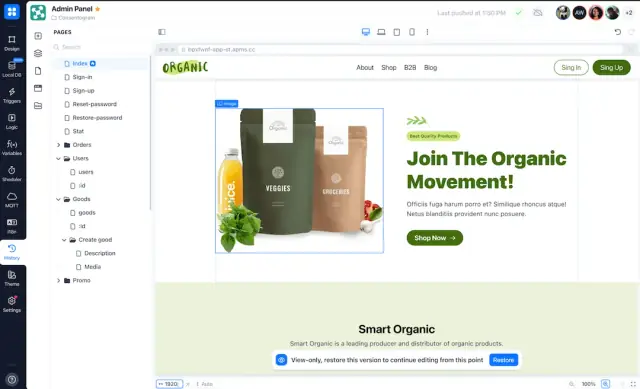
AppMaster is a multifunctional no-code platform capable of providing you with a custom solution at the development team level. In other words, you get the same product that a team of engineers would provide you, only many times faster, cheaper, and easier to implement. Unlike all the platforms presented above, you are not tied to the AppMaster platform, and you can get the source codes of your product. You can continue working in the AppMaster infrastructure or switch to your own by placing the product on your server. AppMaster combines the best of both development worlds - traditional code development and visual programming. From the first direction, you get independence, a high level of customization, and flexibility; from the second direction, you get the ease of execution, speed, and low cost.
Key AppMaster features include:
-
Seamless integrations with third-party apps
-
Realtime updates
-
Scalability with clusters
-
Drag-and-drop builder
-
Web, mobile, backend builder
In conclusion
As we progress in the digital era, the eCommerce industry continues to evolve and expand rapidly. The selection of the best eCommerce platform to build an online store in 2024 is crucial for businesses looking to flourish in this competitive landscape. Key platforms such as Shopify, AppMaster, WooCommerce, BigCommerce, and Wix offer diverse features, scalability, catering to businesses of all sizes and industries. By carefully considering factors such as ease of use, customization, security, and support, entrepreneurs can make an informed decision and select the platform that best aligns with their unique goals and requirements.
Ultimately, a successful online store is not solely about the platform it is built upon but also the strategy, design, user experience, and marketing efforts accompanying it. As such, businesses need to invest in their online presence's technical and creative aspects. By embracing the latest eCommerce trends and harnessing the power of the best eCommerce platforms, businesses can create thriving online stores that stand out in today's digital marketplace and contribute to their long-term success.





